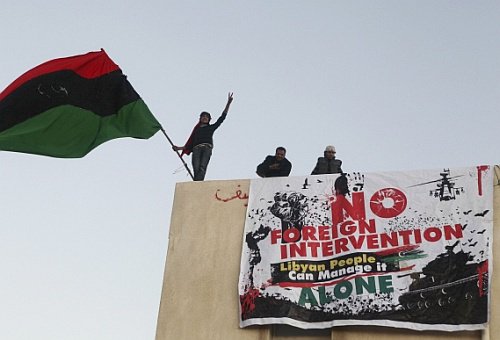It’s amazing how fast things can happen. This time last week we were still arguing about the merits of a no-fly zone and the likelihood of it being established in the first place — late Saturday night the first bombs dropped. In less than a week time the proposal for a no-fly zone was not only voted on and passed, but the preperations for enforcing it were made and finished to such an extent that the French could actually start bombing within a day of it passing and what’s more, immediately exceeded their mandate by bombing tanks attacking Benghazi. After all, resolution 1973 was supposedly all about the no-fly zone wasn’t it, making sure Khadaffi couldn’t use his airforce to bomb civilians, so what are the Armée de l’Air and RAF doing bombing tanks?
Well, it turned out that while the idea of a no-fly zone emerged quickly in media debate once the civil war in Libya started, the assumption that this and nothing more was what the UN had been asked to authorise was wrong. Because while the resolution does establish a no-fly zone, does sharpen the arms embargo and asset freezes already put in place in an earlier resolution, it also does this this:
Authorizes Member States that have notified the Secretary-General, acting nationally or through regional organizations or arrangements, and acting in cooperation with the Secretary-General, to take all necessary measures, notwithstanding paragraph 9 of resolution 1970 (2011), to protect civilians and civilian populated areas under threat of attack in the Libyan Arab Jamahiriya, including Benghazi, while excluding a foreign occupation force of any form on any part of Libyan territory, and requests the Member States concerned to inform the Secretary-General immediately of the measures they take pursuant to the authorization conferred by this paragraph which shall be immediately reported to the Security Council;
(Paragraph 9 of resolution 1970 forbids the supply of arms to Libya — with certain exceptions — and seems to be negated here. Does this mean arms supplies for the Libyan rebels?)
In other words, there’s a legal justification to take every sort of action against Libyan forces short of wholescale invasion, a far wider mandate than we were told was asked for. I’m not sure whether this was by design or accident, but I think it’s sensible to assume the former, especially since France was so quick to start the actual bombing, without even pretending to stick to no-fly zone enforcement. What worries me most is the sense that this was the only thing that was planned and tha, like Afghanistan, like Iraq, nobody has any idea what comes between 1) Bomb the shit out of our enemies and 3) Freedom and Democracy for everybody, that we’re stuck with yet another underpants-gnomian war.
Questions I haven’t seen answered yet are 1) who are the rebels and why should we support them other than whisky democracy sexy, 2) what is the end result we’re fighting for, what is the minimal acceptable outcome of this intervention, 3) how are we going to reach that state other than by bombing the shit out of the country, 4) what if Khadaffi can’t be defeated through aerial power, what then?
I can see two scenarios in which this campaign can end, other than the glorious triumph of western democracy: Iraq 1991 and Iraq 2003. Either we end up with a Libya with Khadaffi in power in the central part of the country and the rebels in control in the east or we might end up with “having to invade” because the air campaign failed. Either way Libya’s screwed and the failure of the opposition to, unlike in Tunesia and Egypt, get rid of Khadaffi on their own does not make me optimistic. Mercenaries or no mercenaries, Khadaffi must still have some sizeable support amongst the population to have survived a wave of protest that did in Ben Ali and Mubarak. Which means that there will be at least part of the population unhappy with any outcome: either the Khadaffi loyalists if he is overthrown, or the rebels if he isn’t. The same was of course true in Egypt and Tunesia, but there the base of support for Mubarak and Ben Ali seemed to be much smaller…
So no, I don’t think third time’s the charm for western intervention in a Middle Eastern/Muslim country.
